Crackdown
Heroin' up.
It's GTA in the future. Or how about: GTA where you're the cop. GTA with superheroes perhaps - but like 2000AD superheroes, not Marvel superheroes. It's a cel-shaded GTA. Right, GTA with 2000AD-style cel-shaded superhero cops from the future. Will that do?
It happens every time a new free-roaming, third-person game set in a city comes out. There's an embarrassing scramble to stick Grand Theft Auto and one or two other easy-to-understand labels (e.g. 'cowboys', 'Simpsons', 'reduced to £9.99') on the front of it to make it more palatable and enticing to supposedly GTA-obsessed gamers. Fair enough, GTA is a massively influential and popular series, and a reference point for a whole genre. And it's true that the comparisons are particularly apt here, because Crackdown creator David Jones worked on the original GTA at DMA Design. But these epithets seldom tell you anything you couldn't work out from a quick glance at some artwork and a screenshot or two, and worse, they can be quite misleading, or undersell a game that dares to be different from its ubiquitous inspiration. So here's a more useful one for you:
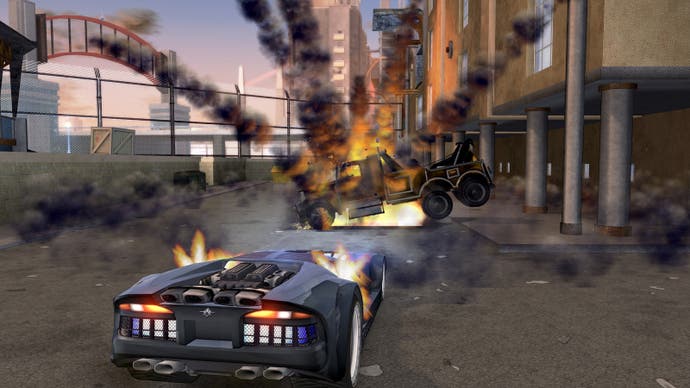
Crackdown is GTA with no missions. At all.
You see, Crackdown is that rare thing, a genuinely free-roaming free-roaming game. Absolutely none of Pacific City - a near-future amalgam of Miami, New York, and Chicago - is locked at the start; you can go anywhere you like. And save for a couple of gentle shoves at the beginning, you're never sent anywhere in particular or told to do anything, so you actually do go anywhere you like.
There is no story to speak of, either. You are a genetically-engineered super-agent, or rather, a whole army of genetically-engineered super-agent clones (who can unfortunately only operate one at a time). You were created by the Agency, a slightly fascist police force that has more or less retreated to its immense control tower after losing control of Pacific City. The three districts of the city have been overrun by three crime syndicates - Latino gangstas Los Muertos, Eastern European mafia the Volk, and slick Asian corporate crims the Shai Gen. Each gang is tougher than the last, and each is composed of a hierarchy of seven bosses. As for where those bosses are - you're on your own with that one. (Although to be fair, if you look lost for long enough, the game's sarcastic Agency narrator will start dropping some heavy hints.)
The only thing the game requires you to do is kill the top boss of each clan, but you can significantly weaken their organisations by killing the sub-bosses in rough order. Needless to say it's a good idea to do so, and it's essential that you improve your own abilities too. This you'll do as you go along, either by tackling bosses in their lairs, or by simply exploring, fighting the low-level criminals and hit squads that wander around the town, and undertaking time trials behind the wheel and on foot.
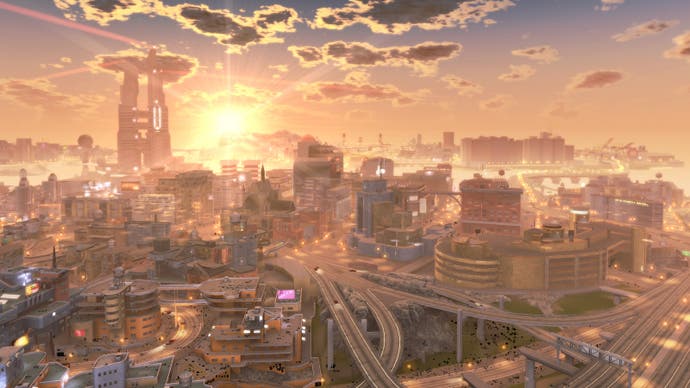
You can improve your attributes in five areas: agility (which improves running speed and jump height), strength (lifting, throwing, hand-to-hand combat), explosives (accuracy and blast radius with grenades and rockets), firearms (accuracy and range) and driving (handling, speed, and mid-air stunt control). For every criminal killed you're awarded points in these areas according to how you kill them; in addition, agility and driving can be improved in the time trials, through stunt driving, and by collecting the agility orbs scattered around the city in enticingly remote spots that can require a good deal of daring, skill and ingenuity to reach. Each attribute can be levelled up from zero to four stars.
And this, frankly, is what Crackdown is really all about. Having played a preview version of the entire game, and sampled the skills of a fully maxed-out agent (well not quite fully... driving is tough to improve, and somewhat peripheral to the others) it looks like Crackdown will provide a sense of mounting, unbridled power that few action games - and not even all that many RPGs - can match. There's a very direct connection between how you play the game and what you get good at, so you're rewarded for what you enjoy. And oh, what rewards they are.
At less than full power, you can already literally leap over buildings in a single bound, and run faster than some cars. Or kick them out of the way, or pick them up and throw them, or do that and then lock on and fire a homing rocket at them as they arc through the air and watch as the resulting explosion takes out an entire road-block's worth of villains and you hoover up a thousand little multicoloured sweeties that will make you more powerful yet. And driving, as well as improving your skills, upgrades the three special agency vehicles available when you return to or regenerate at base: the supercar, SUV and truck cab. Even in basic form these can scoop under, clamber over or smash through everything short of a sheer brick wall, but as you improve they transform into ever more outlandishly cool-looking variants of themselves (accompanied by a visible sonic boom of power) and eventually acquire some pretty special abilities.
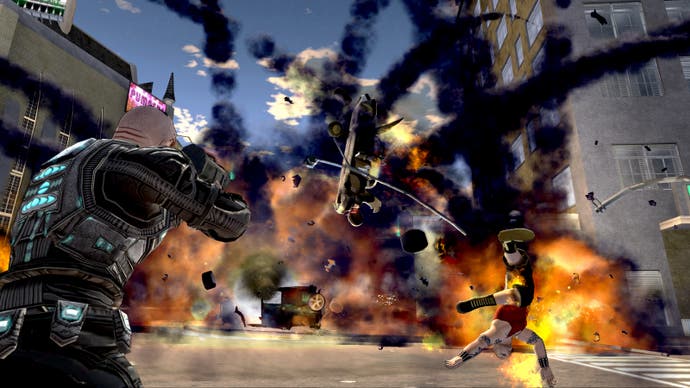
The three agency vehicles - especially the incredible, indestructible, go-anywhere SUV - are amazing creations, but every single car or van or truck or Greyhound bus handles in a convincing, responsive manner. Initial impressions are that the depth and quality of the driving and gunplay - which operates with a sort of semi-lock-on that you need to aim first - are way beyond what you'd normally expect from an all-rounder game like this, certainly better than GTA. However, melee combat is rather basic, and some elements of the control scheme are on the fiddly side.
Make no mistake, Crackdown is a technical marvel. The game engine is stupendously good, hardly breaking sweat or dropping a frame despite the unruly chaos of the action, the exaggerated physics, and the densely populated city. Not everyone will like the flat, strong colours and low detail of the cel-shaded visual style - it's practically the polar opposite of 360 graphics darling Gears of War - but there's no denying that it pops off the screen. And the sound is superb, being both meaty and precise, and boasting an eclectic licensed soundtrack.
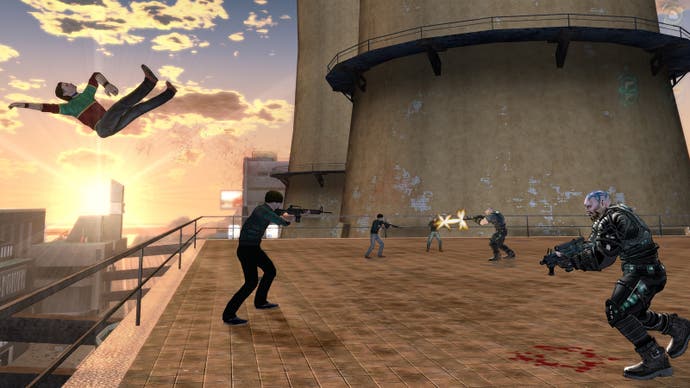
Where Crackdown will divide people - and where it's not easy to judge at preview stage - is in its brave, almost complete lack of structure. Many may feel that there just isn't enough to do, or alternatively get lost; there's definitely a sense that the game is a little lightweight. Early boss encounters are so open-ended that it's easy to blunder and bungle your way through them without getting to grips with the combat at all, and only later in the game will we discover if there's real tactical challenge behind all these dazzling pyrotechnics. A lot will also depend on the quality of the online co-op, a very exciting proposition, but one we sadly weren't able to test.
Crackdown is shaping up to be a true sandbox game, a game where you really have to make your own fun. The toys it provides you with are pretty much unrivalled, and so is the playpen - Pacific City may be smaller than some open gameworlds, but it's far more intricately designed and dense with possibilities (something that makes us very excited for Real Time Worlds' forthcoming cops-and-robbers MMO, A.P.B.). At its best - in the thick of some improvised, explosive chain reaction that you couldn't reproduce if you tried - it recalls nothing less than the emergent action of the first Halo. But only time (and our review) will tell if all this boundless potential gels into half the adventure that did.


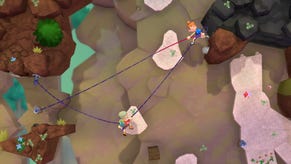
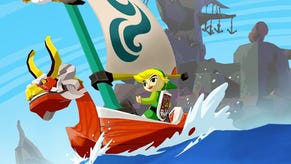
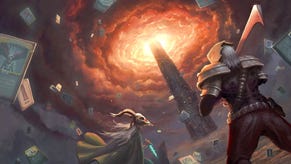

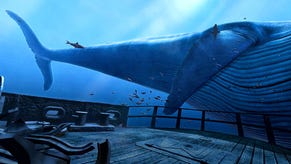
.jpg?width=291&height=164&fit=crop&quality=80&format=jpg&auto=webp)
